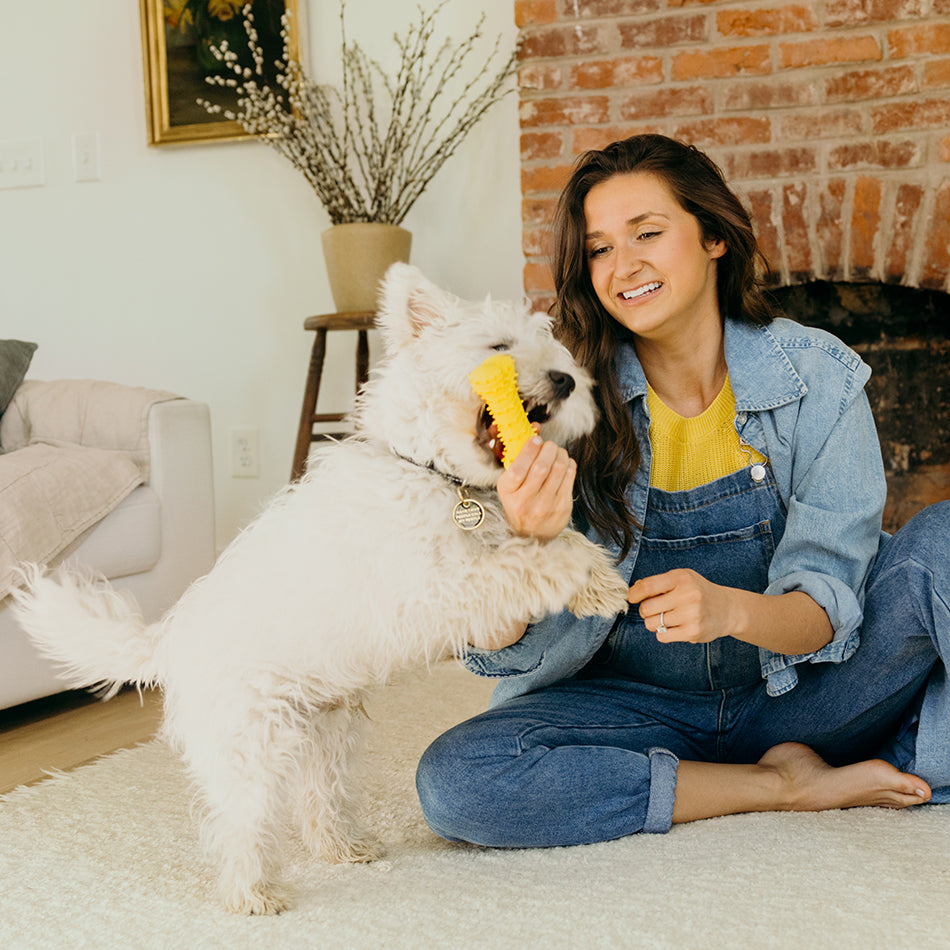
A puppy’s first year is a transformative time that lays the foundation for their personality, behavior, and health. Puppies grow rapidly—both physically and mentally—during this critical period, and play plays a vital role in fostering healthy development. Whether you’re introducing toys for the first time or engaging in interactive games, understanding the stages of puppy development and safe play practices can help you give your furry friend the best start in life.
Understanding the Stages of Puppy Development
Puppies don’t just grow in size; they undergo significant mental and emotional development as they mature. Their early months are divided into three key stages, each requiring a tailored approach to care and play.
1. Primary Stage (Up to 3 Weeks Old)
During this stage, puppies are almost entirely dependent on their mothers for nourishment, warmth, and care.
Limited Senses: At birth, puppies' senses are not fully developed. Their senses of smell and touch are the first to develop, helping them locate their mother.
Human Interaction: Minimal human interaction is necessary at this stage. Puppies are still too young to handle new stimuli or interactions beyond their immediate environment.
Fun Fact: Newborn puppies spend about 90% of their time sleeping and 10% eating during these early weeks. Sleep supports their rapid growth and brain development.
2. Socialization Stage (4-14 Weeks Old)
This stage is vital for building your puppy’s confidence and adaptability.
Developing Confidence: Gradual exposure to people, other animals, and new environments during this time can prevent fear and anxiety later in life.
Safe Play Practices: At around eight weeks, puppies are ready to explore toys. However, it’s essential to ensure that play is gentle, especially for young puppies with developing joints and muscles. Avoid rough play that may overwhelm or scare them.
Bonding with Humans: This is when your puppy forms the strongest bonds with you, making it an excellent time to engage in interactive play.
Pro Tip: Studies show that puppies exposed to a variety of positive experiences during the socialization stage are less likely to develop behavioral issues like aggression or excessive fear.
3. Enrichment Stage (15 Weeks to 1 Year)
This stage is all about reinforcing what your puppy has learned and providing opportunities for them to explore, learn, and thrive.
Physical Activity: Regular playtime keeps your puppy active and supports muscle development.
Mental Stimulation: Games like fetch or puzzle toys stimulate their curiosity and problem-solving abilities.
Independent Play: Allowing your puppy to explore toys on their own fosters independence and self-confidence.
Safe Play Tips for Puppies
Playing with your puppy is essential, but safety should always come first. Here are some tips to ensure your puppy has a positive and safe play experience:
Choose the Right Environment:
Play should occur in a secure area where your puppy cannot wander off or encounter hazards.
Monitor Play Intensity:
Puppies have developing joints and muscles that are vulnerable to strain. Avoid rough games like tug-of-war until your puppy is 8-10 weeks old.
Limit jumping and high-impact activities to protect their growing bones.
Provide Age-Appropriate Toys:
Choose toys that are specifically designed for puppies, free from small parts that could be swallowed.
Toys with varied textures, such as crinkly fabrics or soft spikes, help stimulate their senses and curiosity.
Supervise Playtime:
Always keep an eye on your puppy during play to prevent accidents. Introduce toys gradually to avoid overwhelming them.
Encouraging Healthy Chewing in Puppies
Chewing is a natural and necessary behavior for puppies, particularly during teething, which can start as early as three weeks old and continue through eight months. Encouraging healthy chewing habits not only soothes your puppy’s sore gums but also prevents destructive chewing on furniture or other household items.
Choose Durable, Safe Toys: Choose toys specifically designed for teething puppies, like soft yet tough chew toys with textured surfaces. Toys such as teething bones or ropes with knots provide relief and satisfy their natural urge to chew.
Introduce Variety: Offer toys with different materials, such as rubber, fabric, and crinkly textures, to keep your puppy engaged and interested.
Redirect Behavior: If your puppy starts chewing on something inappropriate, calmly redirect them to an approved chew toy. Reward them when they choose the toy, reinforcing positive behavior.
Provide Supervised Chew Time: Always monitor your puppy during chewing sessions to ensure safety and prevent choking.
Fun Fact: Puppies who develop good chewing habits early are less likely to chew inappropriately as they grow older.
How Play Shapes a Puppy’s Development
Play isn’t just fun—it’s essential for your puppy’s growth and well-being. From improving coordination to fostering emotional resilience, play has many benefits:
Physical Health: Active play helps puppies build strong muscles, maintain a healthy weight, and burn off energy, reducing destructive behaviors like chewing furniture.
Mental Health: Play encourages problem-solving which strengthens cognitive development and teaches puppies how to navigate challenges.
Social Skills: Interactive games like tug-of-war or fetch build trust and teach puppies how to communicate and cooperate with humans.
Fun Fact: Play has been shown to increase dopamine levels in dogs, creating a natural “feel-good” effect that reinforces positive behaviors.
Why Play Matters for Puppies
Research has shown that play impacts a dog’s ability to cope with stress and adapt to new situations. Puppies that engage in regular play are more likely to develop strong social skills and exhibit fewer behavioral problems. Additionally, the act of chewing releases calming hormones that can reduce anxiety in teething puppies.
The Power of Play in Your Puppy’s First Year
Your puppy’s early months are a time of exploration, learning, and bonding. By understanding their developmental needs and providing the right toys and activities, you’re setting the stage for a lifetime of health and happiness.
Start your puppy’s journey on the right paw with toys and games that nurture their body and mind. Explore Playology’s Puppy collection today and see the difference play can make!